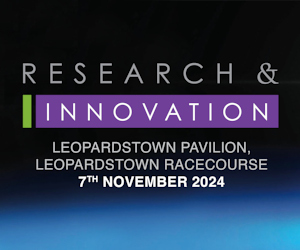UL researcher awarded €1.5m for pioneering solar energy research

University of Limerick electrochemist, Dr Micheál Scanlon has been announced as the recipient of a highly prestigious €1.5m European Research Council (ERC) Starting Grant. Dr Scanlon is the only ERC award recipient in Ireland in physical sciences and one of only 3 Irish based researchers to be awarded an ERC Starting Grant this year.
Based in the Bernal Institute and the Department of Chemical Sciences at the University of Limerick, Dr Scanlon is working on a pioneering experimental approach that seeks to imitate photosynthesis in the leaves of plants, with the goal of efficiently generating clean electricity or solar fuels (such as hydrogen gas).
The world needs solutions for its rapidly growing energy consumption which is projected to double by 2050 and triple by 2100. The advancement of solar photovoltaic (PV) technology is vital to achieve environmentally sustainable progress and continuing economic growth. By 2030 the solar PV market in Europe alone is projected to be worth €10 billion per year.
Current solar PV devices are based mainly on the use of solid inorganic materials which can be expensive to process and occasionally toxic. Dr Scanlon’s pioneering new approach aims to do away with the use of solid materials and instead achieve solar energy conversion using a liquid to liquid interface, similar to the touching point between unmixable oil and water.
Dr Micheál Scanlon explains: “Liquid-liquid interfaces are found everywhere in nature, including in the membranes of cells in plant leaves which are photosynthetic. There are light-harvesting molecules called chlorophyll in these membranes. The liquid-liquid interfaces I use have the fantastic ability to trap and bring molecules together, especially molecules that are similar to chlorophyll. By coating these interfaces in all sorts of light-harvesting molecules I can create an artificial photosynthetic membrane capable of producing energy.”
Dr Mary Shire, Vice President of Research, University of Limerick welcomed the announcement; “Receiving a European Research Grant is a tremendous accolade for any researcher and this year, Dr Scanlon is one of only 3 Irish-based researchers to receive an ERC award. We look forward to the progress and findings of his research at the Bernal Institute in UL.”
Dr Scanlon’s immediate goal is to study the interaction of light with the artificial photosynthetic membranes he is creating. Key advantages of the approach include the ease of scaling up processes involving liquids, in comparison to solid materials, and the low toxicity of the water and oil phases used.
“Using a model system like this is very exciting as it will allow me to answer fundamental questions that can contribute to a better design of solar PV devices. Such insights will not only benefit the development of solar PV devices based on liquid-liquid interfaces but also more traditional approaches, including dye-sensitized solar cells,” said Dr Scanlon.







